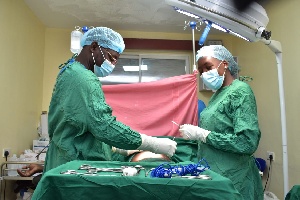Africa News of Monday, 19 May 2025
Source: www.ghanawebbers.com
Nigeria: Time to Deal With Alarming Shortage of Doctors in Nigeria's Hospitals
Nigeria's healthcare system is in crisis. The situation is dire, as evidenced by the lack of response to Kwara State's recruitment ad for doctors. Currently, only 99 doctors serve the state's hospitals. Other medical personnel numbers are similarly low. This issue extends beyond Kwara; it affects the entire nation, especially northern states.
Years of skilled medical personnel leaving Nigeria for better opportunities abroad have worsened this crisis. The Executive Secretary of Kwara State Hospitals Management Board, AbdulRaheem Malik, highlighted this at a recent media briefing. To address the shortage, the governor raised doctors' salaries. This led to three returning doctors, increasing their number from 96 to 99 across 45 facilities.
Patients face daily hardships due to this shortage. A new software application aims to help patients check doctor availability before visiting hospitals. In Jigawa State, a similar shortage prompted approval for hiring 2,124 health workers in December 2024. Meanwhile, resident doctors in Abuja went on strike over unpaid salaries.
Many teaching hospitals struggle with disputes over wages and poor conditions. Many trained doctors now seek jobs abroad instead of staying in Nigeria. Nurses and other healthcare workers are also leaving for countries like the UK and Canada.
Even senior consultants are leaving due to frustration with underfunding and poor equipment. This exodus has increased medical tourism costs significantly—about $2 billion annually according to Health Minister Professor Mohammed Pate. He noted that around 16,000 doctors left Nigeria in seven years.
In 2021, there were about 80,000 registered doctors in Nigeria; now only about 30,000 practice here. In Jigawa State alone, the doctor-to-patient ratio is an alarming 1:21,000—far worse than the World Health Organization's recommended ratio of 1:600.
The current state of healthcare is unsustainable due to this imbalance. Poor salaries and working conditions drive health workers away from Nigeria. Doctors face threats like kidnapping; one was abducted last December and held until September.
To improve healthcare requires more than just salary increases; real change is needed in working conditions and hospital resources. Training opportunities must also be enhanced within teaching hospitals.
Health is crucial for national development alongside education but receives little attention from government leaders. Education systems are failing too; many public schools lack basic facilities and resources.
For instance, a science teacher in Yobe State hasn't been paid since his hiring in 2022—a sign of systemic neglect that hampers future medical professionals' training.
Corruption further complicates matters as funds meant for primary healthcare centers often disappear through dubious contracts by lawmakers. BudgetIT has documented these discrepancies extensively.
University College Hospital (UCH) Ibadan suffers from severe issues like power outages and water shortages that hinder patient care and drive specialists away as well.
Even wealthier states like Lagos underfund their health sectors significantly compared to budget allocations—N46 billion released versus N162 billion planned for health services shows a troubling trend affecting all states.
Addressing these challenges is critical for saving lives in Nigeria’s healthcare system. Learning from successful models like Cuba could provide valuable insights into effective management despite limited resources.











